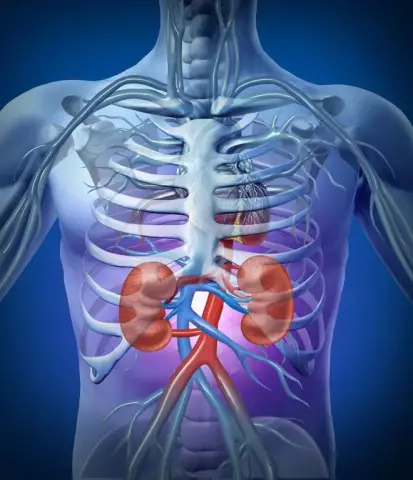- Author Rachel Wainwright wainwright@abchealthonline.com.
- Public 2023-12-15 07:39.
- Last modified 2025-11-02 20:14.
Acute glomerulonephritis
Brief description of the disease
Acute glomerulonephritis is an infectious and allergic kidney disease that is cyclical in nature and develops within 2-3 weeks after any infectious disease transmitted by a person (most often after streptococcal etiology). Glomerulonephritis in children and adults affects the renal tissue, leading to a sharp decrease in their performance and the development of renal failure. At the moment, acute glomerulonephritis is considered one of the most common kidney diseases. It can develop at any age, but in most cases people under 40 get sick.
Acute glomerulonephritis in children and adults - symptoms of the disease
- general weakness, lethargy, poor appetite, nausea, vomiting, headache;
- an increase in the size of the liver, hypertension;
- swelling of the limbs;
- various forms of urinary syndrome (oliurgy, hematuria, proteinuria);
- pain in the lower back and abdomen;
- renal failure syndrome.
Forms of glomerulonephritis

Acute glomerulonephritis most often manifests itself in a cyclic or latent form. The first begins quite violently: a person quickly develops swelling, headache, shortness of breath, discomfort in the lumbar region, the amount of urine decreases and blood pressure rises. The disease proceeds cyclically - after acute attacks of malaise, a short-term improvement in the patient's condition follows, which in no way indicates the complete disappearance of symptoms. If the diagnosis of glomerulonephritis is carried out correctly, and the patient is prescribed adequate treatment, then the edema quickly subsides, and blood pressure returns to normal. However, even after complete recovery, a person may have mild proteinuria.
The latent form is less common in cyclic, but much more often flows into chronic glomerulonephritis. The initial stages of the disease are characterized by the gradual development of symptoms, without any pronounced bouts of malaise. Diagnosis of latent glomerulonephritis is of some difficulty, since the disease cannot be determined by external signs and therefore it is necessary to conduct systematic urine tests.
Acute glomerulonephritis in children - diagnosis of the disease
With glomerulonephritis, erythrocytes and protein (from 1 to 15 g / l) are found in the urine. The disease may be accompanied by mild proteinuria. An obligatory sign of the disease is hematuria, but in the early stages the most characteristic sign of the infectious process is oliurgy (500-600 ml of urine per day). When analyzing blood, doctors reveal a decrease in the number of erythrocytes and hemoglobin, a slight increase in ESR is determined. To make an accurate diagnosis, the patient undergoes a Reberg test, an ultrasound examination of the kidneys, excretory urography and radioisotope renography are prescribed.
Treatment of acute glomerulonephritis
The patient is hospitalized in a hospital, prescribed mandatory bed rest and a strict diet. It is necessary to sharply limit the amount of table salt in food, since this measure itself can lead to increased excretion of water and the subsequent elimination of hypertensive and edematous syndromes.
Further, the patient's diet includes oranges, potatoes, pumpkin and watermelons. These fruits and vegetables provide a nutritious sodium-free diet. The amount of liquid consumed should be reduced to 600 - 1000 ml. per day. You can eat protein foods, it is best to give preference to cottage cheese and egg white. Fats are allowed (no more than 70-80 g per day). Additionally, vitamins are introduced into the patient's diet.

If acute glomerulonephritis is associated with an existing infection, the patient is prescribed antibiotic therapy. In the initial stages, it is advisable to stop taking steroid hormones (dexamethasone, prednisone), since during this period the general symptoms of the disease are very pronounced. Prolonged acute glomerulonephritis in children and adults, as well as the latent form of the disease, require corticosteroid therapy, which has a complex effect, reducing the consequences of edema and urinary syndromes. Refuse corticosteroid drugs should be with moderate arterial hypertension, since it is not an indication for intensive antibiotic therapy.
Due to the fact that acute glomerulonephritis has pronounced symptoms, doctors can quickly make an accurate diagnosis and prescribe adequate treatment. The prognosis is usually favorable, with the exception of particularly severe complications due to the individual characteristics of the patient's body.
YouTube video related to the article:
The information is generalized and provided for informational purposes only. At the first sign of illness, see your doctor. Self-medication is hazardous to health!






